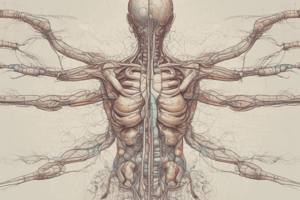Podcast
Questions and Answers
Which of the following symptoms are typically associated with SLUDGE from cholinergic overstimulation?
Which of the following symptoms are typically associated with SLUDGE from cholinergic overstimulation?
- Coughing
- Diarrhea (correct)
- Dry mouth
- Urinary retention
Which of the following is NOT a use for indirect-acting cholinesterase inhibitors?
Which of the following is NOT a use for indirect-acting cholinesterase inhibitors?
- Management of hypertension (correct)
- Reversal of anticholinergic poisoning
- Treatment of myasthenia gravis
- Reversal of neuromuscular blockade
What is a common adverse effect associated with Donepezil?
What is a common adverse effect associated with Donepezil?
- Dehydration
- Constipation
- Increased heart rate
- Nausea (correct)
Which nursing consideration is essential when administering cholinergic drugs?
Which nursing consideration is essential when administering cholinergic drugs?
Which condition may be worsened by the administration of cholinergic agents?
Which condition may be worsened by the administration of cholinergic agents?
Which of the following is an indication for the use of carbachol?
Which of the following is an indication for the use of carbachol?
Which of these is a potential contraindication for cholinergic medications?
Which of these is a potential contraindication for cholinergic medications?
What kind of action do indirect-acting cholinergic drugs have on acetylcholine levels?
What kind of action do indirect-acting cholinergic drugs have on acetylcholine levels?
What does the acronym SLUDGE stand for in relation to cholinergic agonists?
What does the acronym SLUDGE stand for in relation to cholinergic agonists?
Which statement is true regarding the use of cholinesterase inhibitors for Alzheimer's disease?
Which statement is true regarding the use of cholinesterase inhibitors for Alzheimer's disease?
Which of the following is an adverse effect commonly associated with donepezil?
Which of the following is an adverse effect commonly associated with donepezil?
What nursing consideration is important when administering cholinergic medications to patients with myasthenia gravis?
What nursing consideration is important when administering cholinergic medications to patients with myasthenia gravis?
Which drugs may interact negatively with cholinergic medications?
Which drugs may interact negatively with cholinergic medications?
In patients with urinary retention, when should urination be expected after administering bethanechol?
In patients with urinary retention, when should urination be expected after administering bethanechol?
What is a common symptom of overdose in patients taking cholinergic medications?
What is a common symptom of overdose in patients taking cholinergic medications?
Which of the following is essential to assess before starting treatment with cholinergic medications?
Which of the following is essential to assess before starting treatment with cholinergic medications?
Which of the following symptoms is associated with SLUDGE, a condition related to excessive cholinergic activity?
Which of the following symptoms is associated with SLUDGE, a condition related to excessive cholinergic activity?
Cholinesterase inhibitors, when used in pharmacotherapy, primarily counteract which of the following effects?
Cholinesterase inhibitors, when used in pharmacotherapy, primarily counteract which of the following effects?
Which of the following adverse effects is often associated with Donepezil therapy?
Which of the following adverse effects is often associated with Donepezil therapy?
In nursing considerations for cholinergic therapy, which of the following should be monitored closely?
In nursing considerations for cholinergic therapy, which of the following should be monitored closely?
What is a common interaction to consider when administering anticholinergic drugs?
What is a common interaction to consider when administering anticholinergic drugs?
Which of the following natural plant alkaloids is classified as a cholinergic-blocking drug?
Which of the following natural plant alkaloids is classified as a cholinergic-blocking drug?
What physiological effect does the administration of large doses of cholinergic-blocking drugs have on the central nervous system?
What physiological effect does the administration of large doses of cholinergic-blocking drugs have on the central nervous system?
Which of the following is NOT an indication for the use of anticholinergics in the treatment of respiratory conditions?
Which of the following is NOT an indication for the use of anticholinergics in the treatment of respiratory conditions?
Flashcards
Cholinergic Drugs
Cholinergic Drugs
Drugs that mimic or enhance the effects of acetylcholine (ACh), a neurotransmitter in the parasympathetic nervous system.
Muscarinic Receptors
Muscarinic Receptors
A type of acetylcholine receptor that mediates the actions of cholinergic drugs, producing effects like increased secretions, decreased heart rate, and constriction of pupils.
Direct-Acting Cholinergics
Direct-Acting Cholinergics
Drugs that directly bind to and activate muscarinic receptors, increasing acetylcholine activity.
Indirect-Acting Cholinergics (Anticholinesterases)
Indirect-Acting Cholinergics (Anticholinesterases)
Signup and view all the flashcards
Glaucoma Treatment
Glaucoma Treatment
Signup and view all the flashcards
Myasthenia Gravis Treatment
Myasthenia Gravis Treatment
Signup and view all the flashcards
Alzheimer's Disease Treatment
Alzheimer's Disease Treatment
Signup and view all the flashcards
Cholinergic Drug Contraindications
Cholinergic Drug Contraindications
Signup and view all the flashcards
Anticholinergics and NSAIDs interaction
Anticholinergics and NSAIDs interaction
Signup and view all the flashcards
Pre-med assessments
Pre-med assessments
Signup and view all the flashcards
Medication Administration
Medication Administration
Signup and view all the flashcards
Myasthenia Gravis Medication Timing
Myasthenia Gravis Medication Timing
Signup and view all the flashcards
Alzheimer's Drug Purpose
Alzheimer's Drug Purpose
Signup and view all the flashcards
Anti-Alzheimer's Drug Onset
Anti-Alzheimer's Drug Onset
Signup and view all the flashcards
Postoperative GI Monitoring
Postoperative GI Monitoring
Signup and view all the flashcards
Urinary Retention Monitoring
Urinary Retention Monitoring
Signup and view all the flashcards
What are cholinergic-blocking drugs?
What are cholinergic-blocking drugs?
Signup and view all the flashcards
How do cholinergic-blocking drugs work?
How do cholinergic-blocking drugs work?
Signup and view all the flashcards
What is the effect on the cardiovascular system?
What is the effect on the cardiovascular system?
Signup and view all the flashcards
What is the effect on the central nervous system (CNS)?
What is the effect on the central nervous system (CNS)?
Signup and view all the flashcards
What is the effect on the eyes?
What is the effect on the eyes?
Signup and view all the flashcards
What is the effect on the gastrointestinal (GI) system?
What is the effect on the gastrointestinal (GI) system?
Signup and view all the flashcards
What are the common indications (uses) for cholinergic-blocking drugs?
What are the common indications (uses) for cholinergic-blocking drugs?
Signup and view all the flashcards
What are some examples of cholinergic-blocking drugs?
What are some examples of cholinergic-blocking drugs?
Signup and view all the flashcards
Study Notes
Autonomic Nervous System: Cholinergics
-
The autonomic nervous system regulates involuntary functions, and the parasympathetic division has a calming effect.
-
Cholinergic agonists, also called parasympathomimetics, mimic the effects of the parasympathetic nervous system.
-
Cholinergic receptors are of two types: nicotinic and muscarinic.
-
Nicotinic receptors are located in ganglia, while muscarinic receptors affect smooth muscle, cardiac muscle, and glands.
-
Cholinergic drugs can be direct-acting, binding to receptors, or indirect-acting, inhibiting the enzyme acetylcholinesterase.
-
Cholinergics have various effects, including stimulating the intestine and bladder, pupils, cardiovascular system, and respiratory system.
-
Adverse effects of cholinergics are due to overstimulation of the parasympathetic system and can include cardiovascular effects, central nervous system effects, gastrointestinal effects, or respiratory effects.
-
Cholinergic crisis can arise from severe overstimulation of the parasympathetic system, causing circulatory collapse, hypotension, and cardiac arrest.
-
Cholinergic-blocking drugs (anticholinergics, parasympatholytics, and antimuscarinics) block the actions of acetylcholine in the parasympathetic nervous system.
-
Examples of natural plant alkaloids include atropine sulfate and scopolamine.
Cholinergic Blocking Drugs: Examples
- Synthetic and semisynthetic drugs include dicyclomine, glycopyrrolate, oxybutynin, and tolterodine.
- These cholinergic-blocking drugs affect the heart's conduction system (cardiovascular), central nervous system, eye system, gastrointestinal tract, genitourinary tract, and respiratory system.
- The cardiovascular effects often affect decreased heart rate with small doses and increased heart rate with large doses.
- The central nervous system effects commonly include decreased muscle rigidity and tremors with smaller doses, and drowsiness, disorientation, and hallucinations with large doses.
- The eye effects often include dilated pupils and decreased accommodation.
- Gastrointestinal effects often include relaxation of smooth muscles and decreased motility.
- Genitourinary effects often include urinary retention.
- Respiratory effects include decreased breathing secretions.
- Indications of cholinergic blocking drugs include those associated with the cardiovascular system, central nervous system, eye system, respiratory system, gastrointestinal system, or urological system.
- Contraindications of these drugs involve those associated with known drug allergies, angle-closure glaucoma, acute asthma, myasthenia gravis, acute cardiovascular instability, GI or GU tract obstructions, and illnesses.
Cholinergic-Blocking Drugs: Mechanism of Action
- The mechanism of action involves blockade of receptor sites in the autonomic nervous system controlling secretions.
Nursing Implications
- Assessing for allergies, presence of BPH, urinary retention, glaucoma, tachycardia, myocardial infarction, heart failure, hiatal hernia, or GI/GU obstruction is crucial.
- Baseline assessments of vital signs and systems overview are essential.
- Medications should be administered as prescribed.
- Doses should be spread evenly apart.
- Overdosing can lead to severe problems.
- Blurred vision can cause difficulty while driving or operating machinery.
- Sensitivity to light might need dark glasses or sunglasses.
- Pressure to the inner canthus prevents systemic absorption when administering ophthalmic solutions.
- Patients should check with physicians before taking other medications.
- An antidote to atropine overdose is physostigmine.
- Encourage patients to avoid strenuous exercise and maintain adequate fluid intake.
- Monitor patients for therapeutic and adverse effects and appropriate symptoms.
Studying That Suits You
Use AI to generate personalized quizzes and flashcards to suit your learning preferences.
Related Documents
Description
Explore the fascinating world of the autonomic nervous system, focusing on cholinergic mechanisms. This quiz covers the functions, types of cholinergic receptors, and the effects and adverse reactions of cholinergic drugs. Test your knowledge on this vital aspect of human physiology.




